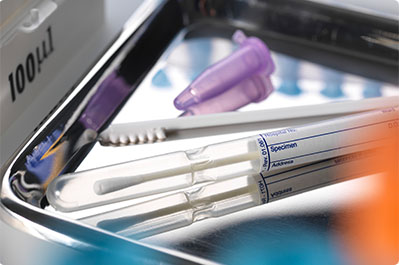
Make 2x the Impact Now
Make 2x the Impact Now
Our March Mission Match is underway, but not for long. Your gift by March 10 can go twice as far to advance research and help provide care and support for those living with Alzheimer’s and their caregivers.
Give NowWhat your genes can and can’t tell you about Alzheimer’s risk
 Available over the counter at an affordable price, at-home genetic testing kits present a tempting proposition — simply spit in a tube and in three to five weeks you’ll receive a report about your genetic risk for developing certain health conditions, including Alzheimer’s disease. But before you add the testing kit to your shopping cart, it’s important to think about what you’ll do with the information it provides.
Available over the counter at an affordable price, at-home genetic testing kits present a tempting proposition — simply spit in a tube and in three to five weeks you’ll receive a report about your genetic risk for developing certain health conditions, including Alzheimer’s disease. But before you add the testing kit to your shopping cart, it’s important to think about what you’ll do with the information it provides.While genetic testing can shed light on important risk factors for certain diseases, researchers still do not completely understand the role genetics play in Alzheimer’s risk. Currently, the gene with the greatest known impact on Alzheimer’s risk is APOE-e4, but this may differ based on your ancestry.
Genetic tests, including those purchased over the counter, are able to tell if a person has this “Alzheimer’s risk gene,” but not if they’ll conclusively develop Alzheimer’s.
Your genes and Alzheimer's
 “Knowing you carry a copy of APOE-e4 would tell you that you are at higher risk than the general population, but it does not mean that you will definitely get Alzheimer’s,” says Alison Goate, DPhil, professor and chair of the Department of Genetics and Genomic Sciences and director of the Ronald M. Loeb Center on Alzheimer’s Disease at the Icahn School of Medicine at Mount Sinai. “There are people who remain cognitively healthy who carry two copies of APOE-e4, and many Alzheimer’s cases have no copies.”
“Knowing you carry a copy of APOE-e4 would tell you that you are at higher risk than the general population, but it does not mean that you will definitely get Alzheimer’s,” says Alison Goate, DPhil, professor and chair of the Department of Genetics and Genomic Sciences and director of the Ronald M. Loeb Center on Alzheimer’s Disease at the Icahn School of Medicine at Mount Sinai. “There are people who remain cognitively healthy who carry two copies of APOE-e4, and many Alzheimer’s cases have no copies.”It’s important to note that APOE-e4 has only been studied in certain populations. Much of what we know about Alzheimer’s and genetic risk comes from research with non-Hispanic White participants, so it is unclear how genetics may drive risk in other groups.
Is Alzheimer's genetic?
Having a parent, sibling or sister living with Alzheimer's increases your risk but doesn't necessarily mean you will develop the disease.
A small percentage of Alzheimer’s cases are caused by gene mutations that guarantee someone will develop the disease. However, these mutations for Alzheimer’s are rare, occurring in less than 1% of all cases. At-home genetic tests do not detect all of the gene mutations that cause Alzheimer’s, or paint a full picture of a person’s risk for the disease.
Beyond genetic risk
There are other risk factors for Alzheimer’s that genetic tests can’t take into account. Right now researchers don’t know exactly what causes the disease, but believe it involves multiple factors, including genetics, environment, lifestyle, coexisting medical conditions and age — the greatest known risk factor.
“You’ll get a lot of information, probably more accurate information, about your broad health risk by looking at your family history than you will by doing a genetic test,” Goate says. “Genetic tests are simply not that accurate [at predicting risk] for most diseases that are caused by many different genetic and environmental factors.” However, genetic testing may have benefits for those who are already diagnosed. For people living with Alzheimer’s who are eligible to take anti-amyloid treatments, confirmation of APOE-e4 may indicate a higher risk for certain side effects. In this case, genetic testing can provide additional information to help inform health care decisions.
However, genetic testing may have benefits for those who are already diagnosed. For people living with Alzheimer’s who are eligible to take anti-amyloid treatments, confirmation of APOE-e4 may indicate a higher risk for certain side effects. In this case, genetic testing can provide additional information to help inform health care decisions.
What you can do
While age, family history and heredity are all risk factors we can’t change, evidence continues to build that healthy lifestyle habits — such as being physically active, eating a healthy diet, quitting smoking, limiting alcohol consumption and engaging in cognitively stimulating activities — are powerful tools to reduce risk and possibly prevent Alzheimer’s and other dementias. “These are things that we should all be doing, regardless of our genotype,” Goate says. “There are things we can control.”Recent research even suggests that combining multiple healthy lifestyle choices may counteract genetic risk. In one study presented at the Alzheimer’s Association International Conference® (AAIC®), participants with a high genetic risk who followed a “favorable” lifestyle had a 32% lower risk of dementia compared with those who had an “unfavorable” lifestyle.
Investigation of the impact lifestyle can have on cognitive decline is currently ongoing through the U.S. POINTER study. This two-year clinical trial looks at how lifestyle interventions like exercise and nutrition impact the brains of older adults who have an increased risk of cognitive decline.
A personal decision
Ultimately, getting a genetic test is a very personal decision. Knowing you have an increased genetic risk could impact you or your loved ones emotionally, or even your ability to qualify for disability, long-term care or life insurance in the future.Before making the decision to undergo a genetic test, talk to a physician or genetic counselor to help you think through some of these considerations.
To learn more about genetic counseling, visit nsgc.org.
Read More ALZ Magazine Articles



Blog posts
Prevention on the Horizon?
What Can We Do to Prevent Alzheimer’s? This Question Has Been Asked by Concerned Individuals, Researchers for Years
January 14, 2019

The first survivor of Alzheimer's is out there, but we won't get there without you.
Donate Now
Learn how Alzheimer’s disease affects the brain.
Take the Brain Tour
